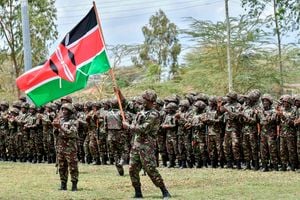
Saul Willis Sewe, 53, the composer of the song Siso Oloya gi Dala, originally written in dholuo, has now been translated into 21 different languages.
| PoolCulture
Premium
21 tongues and counting: The Dholuo gospel hit everyone wants
Saul Willis Sewe was tasked by his church to compose a song to be used for praise and worship during their church convention in Sawagongo, Siaya County. That was in 2015.
But it was not the first time the 53-year-old had undertaken such a task.
Over the years, he had served in similar roles. Church leaders would suggest a theme and Bible verses, and Mr Sewe would compose powerful songs.
But it was this last assignment that would propel Mr Sewe onto the international stage as an artist.
After being asked by the church to come up with a song based on three Bible verses; Psalms 42:1-11, Psalms 63:1-11 and John 1:11-12, Mr Sewe set to work.
Siso Oloya gi Dala', (My Heart Yearns for Home) was the product of the long, arduous hours Sewe spent in the studio.
Originally sung in Dholuo, the song has managed to attract a large number of listeners worldwide, having been translated into 21 different languages.
The song's popularity has also earned Mr Sewe a nickname. They now call him "Siso", a name coined from the song's title.
"Today there are places where the name Saul Sewe doesn't ring a bell, but if you say Siso, the audience will identify me first," said Mr Sewe.
Siso noted that eight years later, the song has been translated into English and is called 'Ah Alas' and 'Shauku la Mji wa Sayuni' in Swahili.
There is also a Maasai version of the song, 'Ataa emeloni e mji sayuni', 'Otta twariga uria' in Kikuyu, 'Amakyinige ane bororiet sayuni' in Nandi, 'Ula uma kwea yesu' in Kamba and 'Amaiga Ekegusi' among others.

Saul Willis Sewe, 53, the composer of the song Siso Oloya gi Dala, originally written in dholuo, has now been translated into 21 different languages.
Internationally, the song has been translated into Lingala as 'Nini Ekosala', 'Ngiphe Amandla' in Zulu, 'Precizzo do poder' in Portuguese, 'Netaga Ontwale Muchubuga Sayuni' in Luganda and 'Yesu Oba Nankasa' in Ghana, among others.
The recorded song was officially launched at St Stephen's Cathedral (ACK) Kisumu in 2019 with Ida Odinga, wife of opposition leader Raila Odinga, as the chief guest.
Mr Sewe credits Mrs Odinga and the Diaspora-based Daughters of Anglican for supporting the production of the song and ensuring that it was copyrighted under his name.
"After composing the song, I performed it at a funeral in Siaya and ran into copyright problems, but Mama Ida later ensured that I got the copyrights to the song," said Mr Sewe.
While the song has gained popularity at funerals over the years, Mr Sewe says the music is not only meant for solemn occasions but also for general praise and worship.
"The message in the song is aimed at the souls of both men and women and was meant to win souls back to God, their creator," he explained.
He went on to say that although he was initially asked to base the theme of the song on the three Bible verses provided, the final product contains many changes.
The first verse, he said, reflects the Bible verses given to him by the church, while the second part of the song reflects his background.
"The second verse is my grandmother's words of wisdom that reflect on my birth and upbringing as an orphan," said Ms Sewe.
The third verse, according to Siso, is about his journey to salvation. He revealed in the interview that he was born again on April 24, 1982.
In the fourth verse, the music speaks of the power of spiritual life, with an emphasis on the strong desire for eternity.
"There are times when we can walk and then we get tired. When we get tired, what do we do? Do we fall? Do we die? The word of God says no, I came to those who are mine. But all those who accepted me as their father," he explained, quoting the Bible.
Mr Sewe explained that when he presented the song to the late Bishop Mwai Abiero of the Anglican Church of Kenya for dedication, he was advised that the message should not be limited to the Luo community. It was then that the idea of translating the song into different languages was conceived.
He said that for the sake of accuracy, he often works with the elders and the youth to help translate the song into different languages.
Mr Sewe revealed that he always invites professionals from different communities to go through the translation before the final copy is released to the public.
"This song cannot be compared to my previous compositions, it has swallowed them all, it has been listened to by so many people and I still hope to have it translated into more languages," said Mr Sewe.
Mr Sewe was born in Sinaga, Siaya County to a single mother who sadly died when he was only two weeks old.
He was then taken to an orphanage in Siaya where he lived for over nine months before being returned to his grandmother.
Music has always been a part of Siso's life as his grandmother, a staunch ACK member, used to sing gospel songs in his presence.
Mr Sewe said he discovered that he was a talented singer while in primary school, where he participated in music festivals.
He later honed his musical skills at Kamabare Boys Secondary School, where he was a Christian Union leader.
He composed his first song while at high school, titled 'Hakinti', a Zulu word meaning 'let it be so'.
The singer says he has in the past been involved in composing a number of songs and school anthems including the Great Lakes University of Kisumu anthem and Sinaga Girls High School anthem among others.





